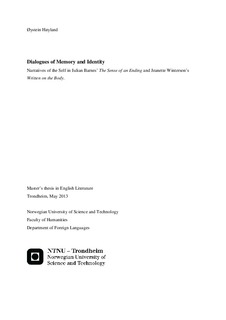| dc.contributor.advisor | Goring, Paul M. | nb_NO |
| dc.contributor.author | Høyland, Øystein | nb_NO |
| dc.date.accessioned | 2014-12-19T13:06:52Z | |
| dc.date.available | 2014-12-19T13:06:52Z | |
| dc.date.created | 2014-02-19 | nb_NO |
| dc.date.issued | 2013 | nb_NO |
| dc.identifier | 697925 | nb_NO |
| dc.identifier.uri | http://hdl.handle.net/11250/243532 | |
| dc.description.abstract | The thesis investigates how two contemporary novels address the relationship between memory and identity in the process of constructing narratives of the self. This question is approached through an analysis of narrative structure in conjunction with close attention to the novels’ contents. Narratology and psychoanalytical literary criticism form the theoretical framework for this analysis. It is shown how the narrators consistently structure their memories into narratives according to what meaning they would like the narrative to create, and how this strategy ultimately fails. The discussions of the novels’ treatment of the topic suggest that both novels treat memories as malleable and identity as a self-interested structuring force. Nevertheless, it is concluded that they both question the individual’s influence over the narratives of the self, and emphasise the role of external reality in the shaping our stories about ourselves. A desire for meaning is the primary structuring force of narrative. | nb_NO |
| dc.language | eng | nb_NO |
| dc.publisher | Norges teknisk-naturvitenskapelige universitet, Det humanistiske fakultet, Institutt for moderne fremmedspråk | nb_NO |
| dc.title | Dialogues of Memory and Identity: Narratives of the Self in Julian Barnes’ The Sense of an Ending and Jeanette Winterson’s Written on the Body | nb_NO |
| dc.type | Master thesis | nb_NO |
| dc.source.pagenumber | 52 | nb_NO |
| dc.contributor.department | Norges teknisk-naturvitenskapelige universitet, Det humanistiske fakultet, Institutt for moderne fremmedspråk | nb_NO |
